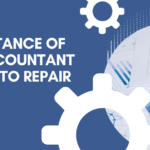Introduction
In the intricate world of auto repair, where precision is paramount, bookkeeping plays a critical role in maintaining the financial health of the business. This article explores common mistakes in auto repair bookkeeping and provides insights on how to steer clear of them. Whether you’re a seasoned shop owner or a budding entrepreneur in the automotive industry, understanding and avoiding these pitfalls can be the key to sustained success in the highly competitive landscape of auto repair. Let’s delve into the nuances of managing bookkeeping for auto repair shops and discover how to navigate this crucial aspect of business management.
Neglecting Regular Reconciliation:
One prevalent mistake in auto repair bookkeeping is the neglect of regular reconciliations. Failing to reconcile bank statements, receipts, and invoices can lead to discrepancies that, if left unattended, may snowball into major financial errors. Regular reconciliation ensures that the recorded transactions align with actual bank statements, providing an accurate financial snapshot.
To avoid this pitfall, make reconciliation a routine practice. This underscores the importance of precision in financial processes.
Inconsistent Categorization of Expenses:
Another common mistake is the inconsistent categorization of expenses. Misclassifying costs can distort financial reports and hinder the ability to make informed business decisions. For instance, parts and labour costs should be accurately categorised to reflect the true cost of services provided.
To mitigate this issue, establish a clear and consistent system for expense categorization. This emphasises the industry-specific nature of expense management in auto repair bookkeeping.
Failure to Keep Track of Inventory:
Auto repair shops deal with a substantial inventory of parts and supplies. Failing to keep a meticulous record of inventory levels can lead to overordering, stockouts, and inaccuracies in cost calculations. These errors can have a cascading effect on profitability and customer satisfaction.
Implementing a robust inventory management system, possibly integrated with bookkeeping software, is crucial. This approach aligns with the expertise required in managing the unique challenges of bookkeeping for auto repair shops.
Incomplete Record-Keeping for Services Rendered:
In the hustle and bustle of an auto repair shop, it’s easy to overlook recording every service rendered. Incomplete record-keeping can result in missed revenue opportunities and inaccurate financial reporting. Every service, whether big or small, should be documented promptly to ensure comprehensive and precise financial records.
Highlighting the significance of meticulous record-keeping, especially for services provided, emphasises the need for thoroughness in auto repair bookkeeping.
Overlooking Tax Deductions and Credits:
Auto repair businesses are entitled to various tax deductions and credits, but overlooking these opportunities is a common mistake. Failing to take advantage of available tax incentives can lead to higher tax liabilities and missed opportunities for financial savings.
To avoid this pitfall, consult with a tax professional who is well-versed in the intricacies of bookkeeping for auto repair shops. Their expertise ensures that your business maximises its eligibility for tax deductions and credits.
Not Embracing Technology:
In an era dominated by technology, resisting the adoption of modern bookkeeping tools can be detrimental. Manual bookkeeping processes are prone to errors and inefficiencies. Embracing technology, such as specialised auto repair bookkeeping software, not only streamlines processes but also reduces the likelihood of mistakes.
Incorporating technology into the discussion underscores the industry-specific tools available to enhance accuracy and efficiency in auto repair bookkeeping.
Ignoring Outsourced Accounting Solutions:
For many auto repair shop owners, handling bookkeeping internally may seem like a cost-saving measure. However, overlooking the benefits of outsourced accounting is a common mistake. Professional accounting services bring expertise, accuracy, and a fresh perspective to your financial management.
Consider outsourcing bookkeeping functions to professionals well-versed in the complexities of the automotive industry. This strategic move can save time, reduce errors, and provide valuable insights into improving your financial processes.
Conclusion
Avoiding common mistakes in auto repair bookkeeping is paramount for the success of any automotive business. By addressing issues like neglecting reconciliation, inconsistent expense categorization, inadequate inventory management, incomplete record-keeping, tax oversight, and resistance to technology, auto repair shop owners can position themselves for financial success.
In conclusion, managing bookkeeping for auto repair shops is about steering your business toward prosperity and sustainability. Precision, diligence, and a commitment to avoiding common pitfalls will ensure that your auto repair business thrives in an ever-evolving and competitive market. Remember, bookkeeping is not just about numbers; it’s about securing the financial well-being of your business.
Want the success of your auto repair business Ceptrum is here to Maximise profit by outsourcing accounting services. We are experts in auto repair bookkeeping. Start your free consultation now.
Read More:






